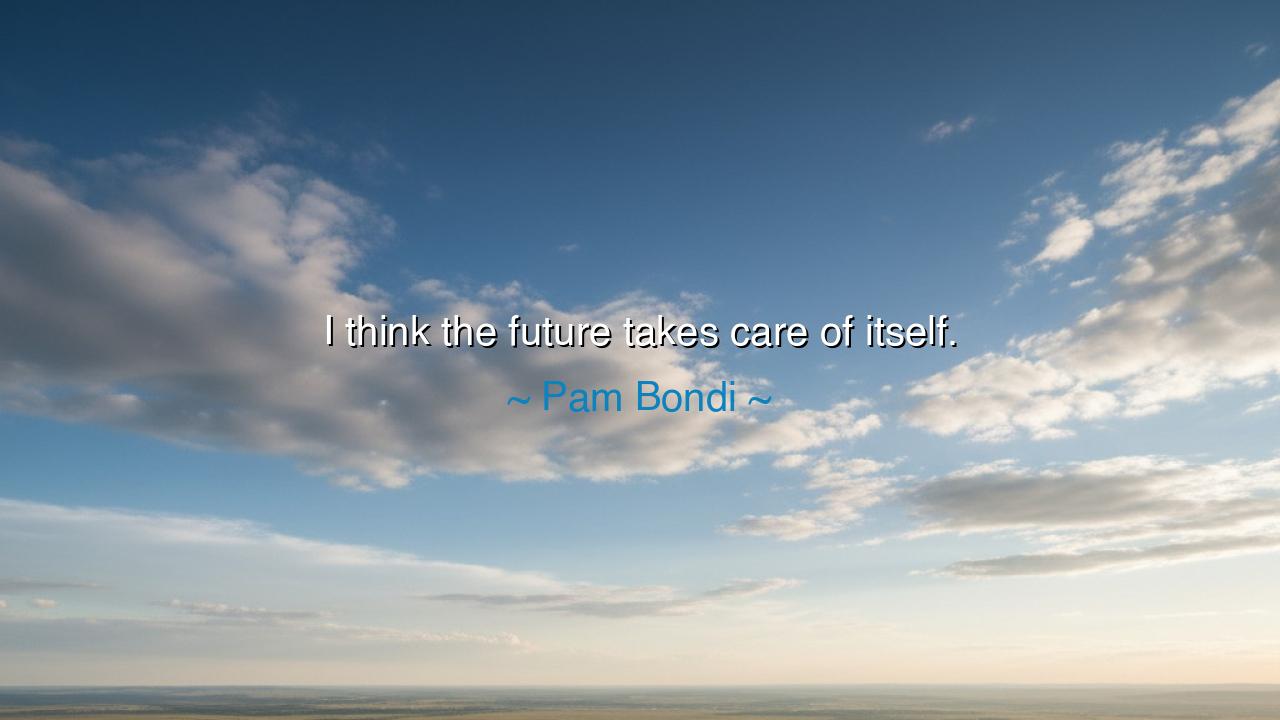
I think the future takes care of itself.






"I think the future takes care of itself." These words from Pam Bondi are a reflection of a deep trust in the unfolding of time and events. Bondi suggests that we need not worry excessively about what is yet to come, for the future has its own way of shaping itself, guided by forces beyond our control. There is a wisdom in acknowledging that, while we can take action in the present, the future—with all its uncertainties and mysteries—will take its own course, shaped by the decisions we make now and the greater forces at work in the world. It speaks to the balance between effort and acceptance, between action and trust in the natural progression of life.
In the ancient world, philosophers often pondered the relationship between human agency and fate. The Greeks, for instance, understood that humans had the power to act, yet the ultimate course of their lives was determined by the gods. The concept of fate, as expressed in the works of Homer, suggested that while mortals could make choices, they were often at the mercy of divine will. Achilles, the great hero of the Iliad, chose his path, but his destiny—his early death—was already written by the gods. In a way, Bondi’s reflection mirrors this ancient understanding: we act in the present, but the future, like the divine forces in ancient myth, unfolds in its own time and in its own way.
Similarly, the Stoic philosophers believed that while we should take responsibility for our actions, we must also accept that the future is often out of our hands. Epictetus, a Stoic thinker, taught that the things we cannot control—like the future—are not worth excessive worry. His wisdom emphasized acceptance of what comes, knowing that we can only control our response to life’s circumstances. Like Bondi, the Stoics recognized the importance of living fully in the present without being consumed by the uncertainty of the future. The future, they believed, would take care of itself if we acted with virtue in the present moment.
Consider the example of Socrates, who, when faced with the trial and imprisonment that would lead to his death, did not fear the future. He chose to live a life devoted to the pursuit of wisdom, teaching others to focus not on what they could not control, but on the actions they could take in the present. Socrates understood that the future was inevitable, and while he did not know his fate, he trusted that his life, lived with integrity and purpose, would have its own place in the grand design of things. Like Bondi’s sentiment, Socrates believed that we must let go of the need to control everything and trust that the future will unfold according to its own design.
Marcus Aurelius, the Roman emperor and Stoic philosopher, also spoke of the need to trust in the unfolding of the future. In his Meditations, he writes of acceptance and detachment from the results of one’s actions, understanding that we can only control our intentions and efforts, not the outcome. The future, in his view, is a mystery that is beyond human understanding, yet it is shaped by the choices we make in the present. Aurelius would agree with Bondi’s words: take action in the present, but do not worry excessively about the future, for it will unfold as it must, regardless of your fears or desires.
The lesson in Bondi’s words is one of trust and balance. While we must engage with the world, take responsibility for our actions, and strive for what we desire, there comes a point when we must release our grip on the future and trust that it will take care of itself. Life is a series of moments—some within our control, some beyond it. To live well is to focus on the present and act with integrity, knowing that the future will follow its own course. As the ancients taught, it is not the worrying about the future that brings peace, but the acceptance of it as part of the larger flow of life.
In practical terms, this means that we must focus on the things we can control—our actions, our attitudes, our choices—and trust that the future will take care of itself. Instead of becoming consumed by fear or anxiety over what is to come, we must be present in our efforts, giving our best to the task at hand. Life will unfold in ways we cannot predict, but if we live with purpose and grace, we will find that the future will reveal itself with the wisdom of time. Just as the Stoics, Socrates, and Marcus Aurelius advised, the secret to peace is not in controlling the future but in living fully in the present, with the understanding that the future will follow the course it is meant to take.






AAdministratorAdministrator
Welcome, honored guests. Please leave a comment, we will respond soon